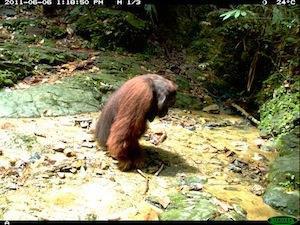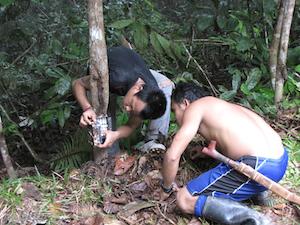Brent R. Loken
Other projects
30 Jan 2012
Protecting the Biodiversity of Wehea Forest in Borneo through Research, Education and Conservation
The project aims to uncover the biological diversity of the unexplored Wehea Forest, thus helping the Wehea Dayak with their continued efforts to protect their forest.
Ethical Expeditions is working with the Wehea Dayak to protect the Wehea Forest located in East Kalimantan, Indonesian Borneo. In 2004, the Wehea Dayak people declared 38,000 hectares of forest, ‘protected land’ under their traditional law. Since this declaration, illegal logging has been reduced, incomes have increased and this project was awarded Indonesia's highest environmental honour. Despite these successes, the long-term viability of this forest is not guaranteed. The land’s legal status is still designated as productive forest, and the Wehea effort is not legally recognized.

Male Orangutan caught on camera trap in Wehea Forest.
As the first phase of a long term conservation commitment to Wehea, Ethical Expeditions is leading a detailed scientific study of the biodiversity of the Wehea Forest. This study will provide critical information necessary for continued protection of Wehea and is a collaborative effort between international and national scientists, NGO’s, the community of Wehea and the Wehea Management Body. Biodiversity data will be collected using a combination of line transect surveys and camera trapping. The line transect surveys will be conducted along a 40 km transect established to provide a representative sample of the habitats and ecosystem types found in Wehea.

Yatim and Soni working as para-biologists to independently monitor the biodiversity in Wehea Forest
In addition to the biodiversity study, a training program is being developed for the rangers of Wehea. This long-term training program will enable the creation of a biodiversity database and sustained monitoring of the biodiversity in Wehea Forest. Results from the biodiversity study will be used to engage the community of Wehea through awareness campaigns and an environmental education program.
This project aims to advance the efforts of the Wehea Dayak to protect their tropical forest ecosystem by conducting an initial biodiversity assessment. Additionally, working with Wehea collaborators, this project will integrate tropical biology and conservation research and the traditional ecological knowledge of the indigenous Wehea Dayak people. This combination is likely to have more power as a tool for developing sustainability than is either alone.